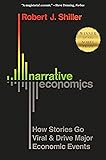
Narrative Economics

The second class is a business confidence narrative that attributes slow economic activity not so much to financial crises as to a sort of general pessimism and unwillingness to expand business or to hire. The third is a consumer confidence narrative
Robert J. Shiller • Narrative Economics
Proposition 6: Contagion of Economic Narratives Builds on Opportunities for Repetition
Robert J. Shiller • Narrative Economics
Allen turned down an offer in 2009 to do one performance and be paid in Bitcoin. This narrative has a memorable punch line: Allen is kicking herself in regret today, for if she’d accepted the offer and held on to her Bitcoin, she would have been a billionaire by 2017.4
Robert J. Shiller • Narrative Economics
In one narrative, the popular singer Lily
Robert J. Shiller • Narrative Economics
2013, the Bitcoin narrative was beginning to fade. It was an old story, and the price of a Bitcoin dropped from over US $1000 at its 2013 peak to just over $200. But a proliferation of new inventions—or mutations—kept the idea alive. Notable among these inventions was the initial coin offering (ICO), which allowed new cryptocurrencies to be
... See moreRobert J. Shiller • Narrative Economics
essential to formulating the foundations of a theory of narrative economics.
Robert J. Shiller • Narrative Economics
Understanding the effects of the “few persons” who create contagious new narratives
Robert J. Shiller • Narrative Economics
Economic historian Joel Mokyr (2016) calls such an individual a “cultural entrepreneur,” and he traces the concept back to philosopher and polymath David Hume, who wrote in 1742:
Robert J. Shiller • Narrative Economics
Garry Kasparov, international chess grandmaster, commented from his own experience: The biggest problem was that even the players would fall into the trap of seeing each game of chess as a story, a coherent narrative with a beginning and a middle and a finish, with a few twists and turns along the way. And, of course, a moral at the end of the
... See more